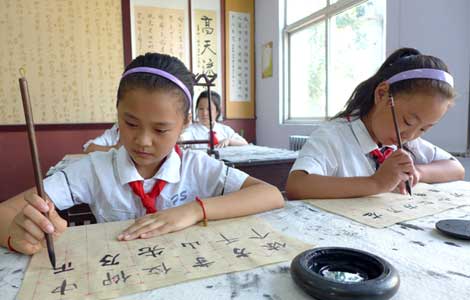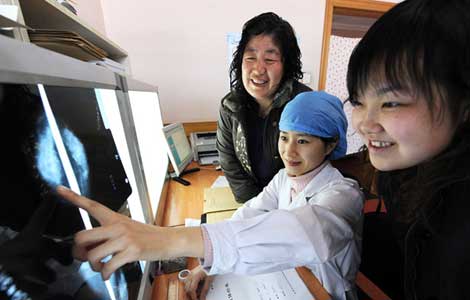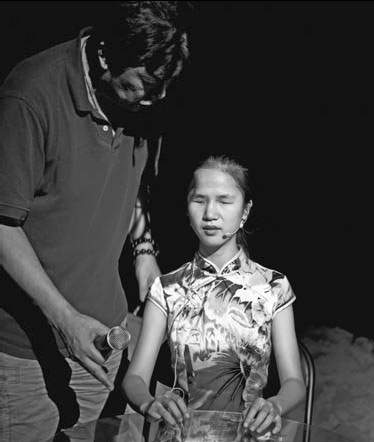Broadcaster a voice for the blind
Updated: 2013-08-28 07:59
By Xu Lin (China Daily)
|
||||||||
|
Dong Lina also performs in Hongdandan's reading drama The Facial Mould of a Maid by the Seine. Provided to China Daily |
Dong Lina's voice is soft and appealing. It's hard to notice that she is visually impaired while one savors the sound of her pure Mandarin.
The 29-year-old from Dalian, Liaoning province, may be the first visually challenged person in China who has been admitted to a university to study broadcasting. Despite many difficulties, she became a professional broadcaster and won the second prize of the National "Xia Qing Cup" Recitation Contest.
"Impaired sight may affect us psychologically, but we can overcome the difficulties," says Dong, who has congenital amblyopia and lost her eyesight totally at the age of 10.
She works at Beijing Hong-dandan Education and Culture Exchange Center, a nonprofit organization that aims to improve the quality of life of the visually impaired. Her main job: training NGO's volunteers to record voice books for the visually challenged.
"Hongdandan is like my family and changes my life," she says. "Without my first step here, I wouldn't dare to have any dream after that," she says.
Graduated from a polytechnic school in 2003, she became a masseuse in her hometown, with a monthly salary of nearly 3,000 yuan ($490). In China, that's often one of the few jobs open to blind applicants.
In 2006, she learned about Hongdandan's broadcasting training for the visually challenged via the Internet.
"I didn't like being a masseuse. It was my way to make a living, but I wouldn't give up finding what I really want to do," she says.
Dong took a train to Beijing, in spite of her parents' strong opposition. It was her first long journey on her own.
Though Hongdandan's training had already ended, the NGO paid for Dong to learn broadcasting at Radio Beijing Corporation's Training Center several months later.
She found the Chinese language to be charming, as each word was articulated like a pearl from the teacher.
It was not easy for her to keep up with others. She recorded all the classes and listened to them repeatedly. While other classmates could start to practice as soon as they got the materials, she had to type them in Braille. Fortunately, many classmates volunteered to read them out for her.
"I was moved, as there was no barrier between us. It's a sweet memory," she says.
The training only lasted 10 days - long enough to let her master the method to study on her own.
In June 2007, she passed the National Mandarin Proficiency Test (an oral test of Mandarin) with a high score. Later, she became the broadcaster and editor of Xinmu Cinema, which was broadcast on China National Radio. It came from one of Hongdandan's projects with the same name. The NGO plays free movies for the visually challenged each Saturday, with volunteers explaining the visuals of the films.
She first got media attention in 2010, when she stood out among tens of thousands of candidates in the "Xia Qing Cup" contest.
The contest's secretary general of the organizing committee, Wang Jing, told CCTV that Dong won the judges' recognition with her own ability.
Wang, together with other judges eager to help Dong, recommended her for a broadcasting training scholarship at the Communication University of China.
In April 2011, she tried to join the Higher Education Self-Taught Examination and get a certificate, but failed as there was no precedent like herself. Her application was refused several times.
Zheng Xiaojie, secretary general of Hongdandan, contacted the Beijing Education Examinations Authority and Beijing Municipal Commission of Education, to fight for Dong's rights. The incident attracted much attention after reports in the media, and many people volunteered to help her.
"There was no reason to refuse me. I didn't know when I would succeed, but I kept striving for it," she says.
Several months later, officials from the Beijing Education Examinations Authority decided to allow her, and all visually challenged people, to join the exam in Beijing.
She took the written exam in a separate room, with a computer installed with screen-reading software. For the oral test, she had extra time to type the exam paper into Braille and then answer the questions.
Thanks to Hongdandan volunteers who read out all the textbooks and recorded them, she passed the exam. Now they're recording textbooks of other majors, to help those in need.
"Lina is very hard working. Her success gives me hope, so that I have confidence to persist in helping the visually impaired," says Zheng, whose husband Wang Weili often teaches Dong. For example, he tells her to practice in life, which means to talk to others in her broadcasting voice.
"My current job is very meaningful," says Dong. "I like to use the language art to affect others, so that more people will know about the visually impaired."
xulin@chinadaily.com.cn
(China Daily USA 08/28/2013 page10)

 Five apps to help you 'breathe' in Beijing
Five apps to help you 'breathe' in Beijing
 Wozniacki survives battle with Chinese qualifier
Wozniacki survives battle with Chinese qualifier
 Moscow air show opens with flight demonstrations
Moscow air show opens with flight demonstrations
 US preparing for probable strike on Syria
US preparing for probable strike on Syria
 Putting money on full moon
Putting money on full moon
 Language list aims to pass on Chinese culture
Language list aims to pass on Chinese culture
 Cancer patient delivers healthy baby
Cancer patient delivers healthy baby
 Chinese navy starts escort mission at Gulf of Aden
Chinese navy starts escort mission at Gulf of Aden
Most Viewed
Editor's Picks

|

|

|

|

|

|
Today's Top News
US envoy to visit DPRK to secure prisoner's release
US 'must consider impact' of winding down QE
China gearing up for plenary session
Japan suspends rocket launch at last minute
Global expertise a scarce asset for employers
Sino-Japanese meeting at G20 ruled out
New time limits for visa processing
Trending news across China
US Weekly

|

|








